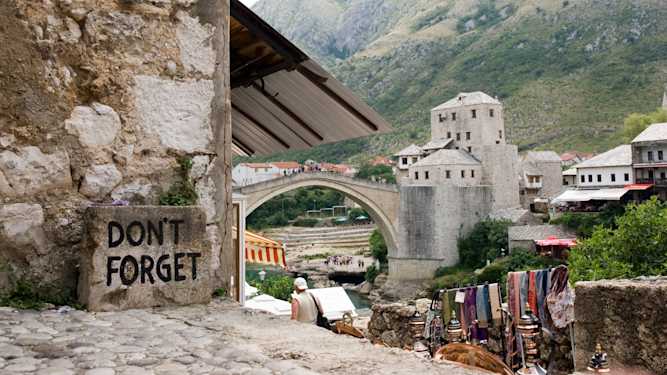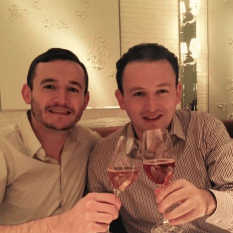
Bosnia 2025 - July
Throughout 2025, Ian Bancroft is collecting reflections on Bosnia-Herzegovina thirty years on from the end of the war. These reflections, supplemented by other insights and stories, explore various dimensions (peacebuilding, reconciliation, culture,education, politics), while reflecting on the past and the future.
To contribute your reflections on Bosnia-Herzegovina, please click here.
Read previous months here:
For residents of Sarajevo, in particular, the scenes of starvation from Gaza bring back memories of the pathetic provisions delivered during the Siege of Sarajevo. Rumour has it that some of this food was left over from the Vietnam War, and had expired twenty years before, and often contained pork (in a city with a substantial Muslim population). According to popular legend, even cats and dogs refused to eat it.
To commemorate such neglect, Nebojša Šerić Šoba conceived of a structure entitled the ‘ICAR Canned Beef Monument.’ The monument, constructed of steel and marble, is inscribed with the infamous words of an anonymous citizen - ‘if there is another siege, I would rather die than eat ICAR.’
They would have preferred weapons (or at least medicines), no matter what calibre, to recycled tin cans.
For Mladen Bubonjić, a professor and journalist from Banja Luka, the ‘multiple complexity of BiH’ in terms of its identity, ideology, politics, and history, means that it ‘is illusory and naive to expect that a society can be formed on the model of Western civil societies, at least in the future.’ There are simply ‘too many obstructions caused by numerous aspects that make it difficult or impossible to form such a society,’ he adds.
This situation is repeatedly exploited by political elites ‘taking advantage of the situation in which mutual misunderstanding leads to distrust, which leads to fear, which ultimately leads to latent hatred,’ Mladen surmises.
This simmering tension is deliberately reignited around sensitive historical dates, ensuring that the wounds of the past never fully heal: ‘Although it is not present every day, it is enough to revive emotions and memories on the eve of traumatic dates and anniversaries to stir up passions again. And so it has been for 30 years - January 9, March 1, July 11, November 21, November 25 - every year they provoke the same emotions and the same reactions.’
This relentless cycle is perpetuated by those in power, Mladen contends, with ‘politicians and the media, instead of working to repair the consequences and resolve the causes of the outbreak of conflicts, year after year additionally encourage and revive divisions.’ The result is ‘stalemate,’ with ‘no indication of when or if it could be resolved at all.’
As the anniversary of the Srebrenica genocide approaches, attention inevitably turns to the 7,600 or so still unaccounted for in BiH. This year, seven newly identified Srebrenica victims will be laid to rest.
The painstaking work of identifying the victims of mass atrocities has been spearheaded by the International Commission on Missing Persons (ICMP), which has pioneered the use of DNA techniques, which have been employed in other war-affected contexts such as Ukraine, Iraq, and Syria.
Furthermore, the ICMP has worked to enshrine a commitment to enshrine missing persons cases as a matter of law, not just a humanitarian priority, by emphasising that families have a right to know about the fate and whereabouts of their missing relatives.
Tihomir Dakić, president at the Centar za životnu sredinu (Center for Environment) in Banja Luka, offers a devastating critique of the state of civil society in BiH, arguing that environmental NGOs have been ‘kept underdeveloped to have easier management from abroad or from internal decision-makers.’ The assertion is that civil society is weak because of, not despite, international assistance.
Part of this underdevelopment, Tihomir explains, derives from the centralised, unfair, and uneven distribution of funds, with other thematic areas such as reconciliation favoured over environmental issues; a topic he believes is ‘abused more than used.’ Despite the availability of funds, the majority ‘remain in a first dam, which is Sarajevo, unfortunately,’ he stresses, with many drawn to environmental issues because they are deemed ‘lucrative.’
The Center acts as a ‘watchdog organisation’, pursuing ‘legal cases against institutions at different levels in all BiH.’ Their focus shifted to environmental protection in the early 2000s with privatisation, which meant that companies ‘started to grab all the natural resources around us - rivers, mountains, forests, whatever.’ It was a reality that ‘media darkness in Bosnia’ was not ready to expose.
Tihomir is critical of foreign diplomats and domestic politicians, who he believes do not fully grasp BiH’s social development needs. ‘They cannot answer because they don’t think that broadly, or they don’t have a vision about that,’ he says. Some, he believes, ‘don't give a shit, because they consider BiH a peaceful place, very close to Europe, a nice paid position, with a surrounding population that will serve them, and it’s a step towards a better place, a more interesting place to be a diplomat.’
To contribute your reflections on Bosnia-Herzegovina, please click here.
You can also contact Ian directly by clicking here.
Ian is a writer based in the Balkans. He is the author of 'Dragon's Teeth - Tales from North Kosovo' and 'Luka'. Follow Ian on Twitter @bancroftian.
Currently in: Belgrade, Serbia — @bancroftian
